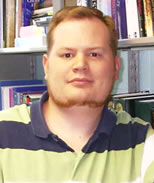Dr. Joshua Moore

Associate Professor
Contact Information:
Office: 217 Boswell Science Building
Phone: 615.963.5336
Email: jmoore17@tnstate.edu
Research Description
General
Research activities in the Moore research lab lie in the areas of synthetic inorganic chemistry, materials chemistry, materials science, and nanomaterials. The research efforts in Dr. Moore's lab center on the synthesis of novel inorganic materials at both the macro-/meso- and nano-scales. Fundamental themes present in this research effort is the use of chemically "soft" methods (i.e. solution based, room temperature or low temperature routes) for material preparation and the use of designed, single-source or dual-source molecular precursors used to control the elemental composition of the final material. Areas are of current interest include:
1. Ceramic Nanocomposite Materials
Sol-gel chemistry is a facile, solution-based method for the preparation of metal oxide materials, and composite materials thereof. Research in this are focuses on the covalent incorporation of nanocrystal precursors into a ceramic, sol-gel matrix. Thermal treatment of these intermediate precursor/ceramic composites yields nanocomposites consisting of nanocrystals of a desired material widely dispersed throughout a ceramic host matrix.
2. Metal Sulfides
Metal sulfides are a technologically important class of materials with applications ranging from light harvesting components in solar cells to catalysis to solid-state lubrication. Research in this area will probe new methods for the room temperature or low temperature preparation of various metal sulfide powders and nanocrystals, including pH dependant decomposition of molecular precursors and "thio" sol-gel reactions.
Publications.
1. Bajaj, P.; Woodruff, E. A..; Moore, J.T. " Synthesis of PbSe/SiO2 and PbTe/SiO2 nanocomposites using the sol-gel process" Materials Chemistry and Physics 2010, 123, 581-584.
2. Moore, J.T.; Marsh, T.P.; Woodruff, E.A. "Preparation of PbS/SiO2 nanocomposites from silica gels containing covalently incorporated lead thiolate precursors" Journal of the Tennessee Academy of Science 2010, 85, 37-40.
3. Hall, S.; Bradley, T.; Moore, J.T.; Kuykindall, T.; Minella, L. "Acute and chronic toxicity of nano-scale TiO2 particles to freshwater fish, cladocerans, and green algae, and effects of organic and inorganic substrate on TiO2 toxicity" Nanotoxicology 2009, 3, 91-97.
4. Moore, J.T. "Semiconductor/ceramic nanocomposites: synthesis, characterization and properties" in Nanomaterials: Inorganic and Bioinorganic Perspectives2008, 1, 747-758.
5. Moore, J.T.; Lukehart, C.M. "Formation of Bi-Sb, Bi-Sn, and Bi-Sb-Sn nanoclusters in silica xerogel matrices from mixed-metal oxide precursors" Journal of Cluster Science 2003, 14, 75-83.
6. Moore, J.T.; Lukehart, C.M. "Hexagonally shaped Bi-Te nanocrystals and Bi or Bi-Te/ceramic nanocomposites of high metal loading from mixed-metal oxide precursors" Journal of Materials Chemistry 2002, 12, 288-290.
7. Moore, J.T.; Corn, J.D.; Chu, D.; Jiang, R.; Boxall, D.L.; Kenik, E.A.; Lukehart, C. M. "Synthesis and characterization of a Pt3Ru1/Vulcan carbon powder nanocomposite and reactivity as a methanol electrooxidation catalyst" Chemistry of Materials 2003, 15, 3320-3325.
8. Moore, J.T.; Chu, D.; Jiang, R.; Deluga, G.A.; Lukehart, C. M. "Synthesis and characterization of Os and Pt-Os/Carbon nanocomposites and their relative performance as methanol electrooxidation catalysts" Chemistry of Materials 2003, 15, 1119-1124.
9. Moore, J.T.; Lukehart, C.M. "Bismuth nanostructured materials" in Encyclopedia of Nanoscience and Nanotechnology 2004, 1, 375-381.
10. Lu, W.; Steigerwalt, E.S.; Moore, J.T.; Sullivan, L.M.; Collins, W.E.; Lukehart, C. M. "Carbothermal transformation of a graphitic carbon nanofiber/silica aerogel composite to a SiC/silica nanocomposite" Journal of Nanoscience and Nanotechnology 2004, 4, 803-808.
11. Anderson, A.D.; Deluga, G.A.; Moore, J.T.; Vergne, M.J.; Hercules, D.M.; Kenik, E.A.; Lukehart, C. M. "Preparation of Pt-Re/vulcan carbon nanocomposites using a single-source molecular precursor and relative performance as a direct methanol fuel cell electrooxidation catalyst" Journal of Nanoscience and Nanotechnology 2004, 4, 809-816.lecular precursors and "thio" sol-gel reactions.
Teaching
I teach a variety of courses at both the undergraduate and graduate levels. Current students may access relevant course materials, including the course syllabus, schedule, and lectures notes/outlines/handouts, through the myTSU system accessible through the TSU webpage .
|
Undergraduate Courses |
Graduate Courses |
|
CHEM 1110/1111: General Chem. I & Lab |
CHEM 5000: Advanced Inorganic Chem. I |
|
CHEM 1120/1121: General Chem. I & Lab |
CHEM 5010: Advanced Inorganic Chem. II |
|
CHEM 3000: Introduction to Inorganic Chem. |
CHEM 6005/6006: Seminar I/II |
|
CHEM 4200/4210: Inorganic Chem. I/II |
|
|
CHEM 4201: Inorganic Chem. Lab |
|
|
CHEM 4505/4506: Senior Project |
|
|
CHEM 4910/4920: Seminar |
I have also developed and taught special topics courses in Introduction to Nanoscience & Technology and Introduction to Materials Chemistry at both the graduate and undergraduate levels.
webpage contact:
Chemistry


